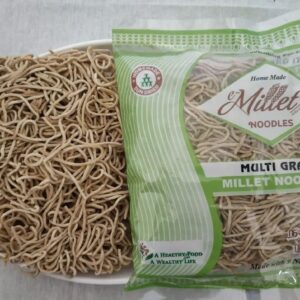Description
Millet curry leaf noodles offer a nutritious and potentially beneficial alternative to traditional noodles, being rich in fiber, protein, and micronutrients like iron, calcium, and B vitamins, while also potentially aiding digestion and supporting overall well-being. Here’s a more detailed look at the benefits: Nutritional Benefits: Millet: Rich in nutrients: Millet noodles are packed with essential nutrients like fiber, protein, and minerals. Fiber: Millet is a good source of dietary fiber, which promotes digestion and aids in weight management. Micronutrients: They are rich in essential micronutrients like iron, magnesium, potassium, and B vitamins. Finger millet (ragi): Finger millet, in particular, is a great source of calcium, beneficial for bone health. Low Glycemic Index (GI): Millet has a lower GI than many other grains, meaning it raises blood sugar slowly, which is beneficial for people with diabetes. Curry Leaves: Antioxidants and Vitamins: Curry leaves are rich in antioxidants and vitamins like A, B, and C. Minerals: They are also a good source of minerals such as calcium, phosphorus, and iron. Digestive Health: Curry leaves can aid digestion and potentially reduce constipation. Other potential benefits: Curry leaves are known for their potential medicinal properties, including promoting hair health and having anti-inflammatory effects. Other benefits of millet noodles No Maida, Preservatives, Artificial Flavors, Cholesterol, or Trans-Fat: Some millet noodles are made without these ingredients, making them a healthier option. High in Energy: Millet noodles can provide a good source of energy. Rich in Vitamin B12, Magnesium, and Antioxidants: Some millet noodles are rich in these nutrients. Rich in Protein, Fiber, Calcium, Potassium, and other minerals:










Reviews
There are no reviews yet.